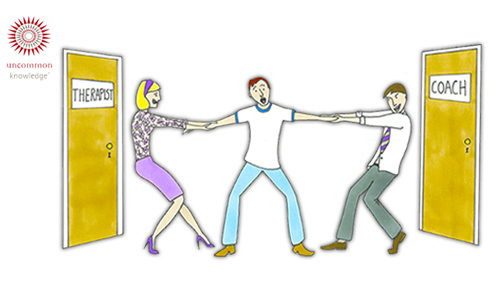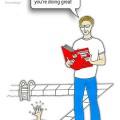
I’d never seen anything like it; Ken had an uncanny knack for knowing just what his client needed.
It wasn’t just the fact that he listened so well – it was the way he fed back what he’d heard with such precision. He didn’t just echo the client’s words, he captured her feelings. It was obvious how deeply understood and safe she felt with him.
But it didn’t end there.
Ken’s timing was perfect. Therapists often make the mistake of being too solution focused too soon, without building the necessary rapport first. Not Ken. His natural empathy and acuity meant that he knew almost intuitively how to help his client form goals and how to naturally reframe her damaging beliefs, not by conflicting with them but by widening the context.
He helped the client relax and within a single session had her feeling so empowered, so hopeful about her future.
Afterwards I congratulated Ken and told him how impressed I was. He looked at me sheepishly and said something that caught me a little by surprise.
“Well, that was just coaching. I’m no therapist!”
Of course, what he said was technically true. This was Ken’s first assessed session in the Uncommon Knowledge psychotherapy course, and before coming to us, he had been working as a life coach – not a therapist. But what he said made me really think.
Just what is the difference between coaching and therapy?
I’m often asked what the difference is, or even whether there is a difference, between therapy and coaching.
In a 2001 study, 30 mental health professionals, ranging from counsellors to coaches (and sometimes both!) were asked seven questions tackling different aspects of this very question.
The perceived differences between coaching and therapy more or less amounted to this:
- Coaches are more likely to focus on career and personal goals, while therapists are more likely to deal with depression and other mental health issues.
- Therapists and coaches use different techniques.
- Coaches focus more on the future, therapists more on the past (though this idea has evolved and changed over the decade and a half since the survey was published).
- The coaching relationship is more casual; the therapeutic relationship has more ‘boundaries’.
- Coaches tend to give more directives and advice than therapists.
Some of the practitioners saw a significant overlap between therapy and coaching. And of course, there are many different schools of psychotherapy and coaching. So what do I think?
From bad to good to great
Generally, or I should say traditionally, coaches deal with helping people go from good to great. They help people who are generally already functional in their lives to follow their aspirations to greater fulfilment and productivity. Goals are clear, and steps are formed and taken.
But if a client isn’t doing so well, some coaches will refer them to a therapist. They may feel unable to help them with their emotional problems, as opposed to, say, their goals and aspirations.
Therapists and coaches I’ve spoken to have said that therapists are more likely to view clients through a medical model. Ken himself told me he thought therapists were interested in the ‘why’. Why did people develop depression, anxiety, addictions and phobias? Coaches, on the other hand, were more likely to focus on the ‘how’. How can this person move forward?
But I see it differently. I think coaches are well placed, perhaps best placed, to become some of the best psychotherapists. Therapists can learn a lot from coaches, and coaches can learn a lot from therapists, if we can just recognise that the divide between us is not so great.
Updating skills
Many therapists are now keen to update their skills and become more solution focused, so they can help people move towards the ‘how’ rather than just discover the ‘why’. Insight alone isn’t always enough to help people live happier and healthier lives.
This trend towards solution-focused, practical psychotherapy, which aims to teach clients skills beyond self-reflection, follows the publication of an international meta-analysis (1) into the best treatments for clinical depression.
This 15-year research project analysed 100,000 studies from around the world and concluded that time-limited, solution-focused, practical, goal-orientated psychotherapy had much better outcomes for clients suffering clinical depression than drug treatment alone.
Further, it found that past-focused, insight-type therapies – those that focused too much on the ‘why’ rather than the ‘how’ – were actually contraindicated for the treatment of depression, presumably because they can encourage rumination, which is toxic for depressed people (2).
Learning from one another
I’ve noticed that counsellors are increasingly cross-fertilizing their skills base. I’ve spoken with psychologists who are learning mindfulness techniques and life coaches who are learning how to lift severe PTSD – helping people go from bad to good to great.
Many therapists are only now learning to be solution focused, to find strategies to lift depression fast, rather than just uncovering the rationales behind the formation of their suffering. But coaches already work in proactive ways that help their clients lead happier lives in the present and future. We as therapists can learn a lot from their approach.
That’s not to say coaches can’t also learn a lot from therapists. Most modern therapists have a valuable knowledge base when it comes to:
- Using solution-focused questioning and goal setting (though this is a skill many coaches already have in spades)
- Fluently and conversationally cognitively reframing
- Lifting many traumas and phobias quickly
- Understanding and dealing with the cycle of depression
- Helping clients overcome addictions
- Helping clients meet their primal human needs.
The challenge is to do all this while listening carefully, building and maintaining rapport, and showing empathy. That’s what impressed me so much about Ken – all these things seemed to come to him naturally.
So what does all this mean?
Not knowing how good you are
Ken was used to looking for the light. He scanned for resources in his clients. He was accustomed to doing this because his excellent coaching training had equipped him to help people go from good to great. But of course, he also had wonderful natural empathy, which he beautifully demonstrated by feeding back metaphors and meaning to his clients in order to facilitate deeper rapport.
But, after his first session, he still felt that he somehow couldn’t ‘do therapy’, because he had swallowed the idea that therapy had to be somehow hallowed, precious, sacrosanct, even humourless – and there had been a lot of natural humour in his session.
He, like so many others, had a limited idea as to what therapy was or could be. Therapy can, indeed should, sometimes be ‘rough and ready‘, sometimes directive, sometimes sensitive and careful. It all depends on the context, the type of client, where they are at, therapist intuition, as well as more formal types of knowledge.
Ken, and I imagine many other coaches, didn’t realise at first how well his coaching had equipped him to become a really great therapist. Or how good a therapist he already was.
But he kept at it and, judging by the satisfaction of clients I’ve referred to him, I’m happy to say he really is one of the best. Ultimately, it’s client happiness that counts.
No matter what type of practitioner you are, our online Uncommon Hypnotherapy course teaches you hypnotic techniques you can blend into your practice. Join us on the course here.
Notes:
- Antonuccio, Danton and DeNelsky’s meta-analysis of more than 100,000 studies of depression treatment (‘Depression: Psychotherapy is the best medicine’) found that so-called ‘insight therapy’ (which merely looks at what went wrong) has a poorer outcome for depressed people than no therapy.
- See http://www.bbc.co.uk/news/magazine-24444431 and http://link.springer.com/article/10.3758/CABN.10.4.470










